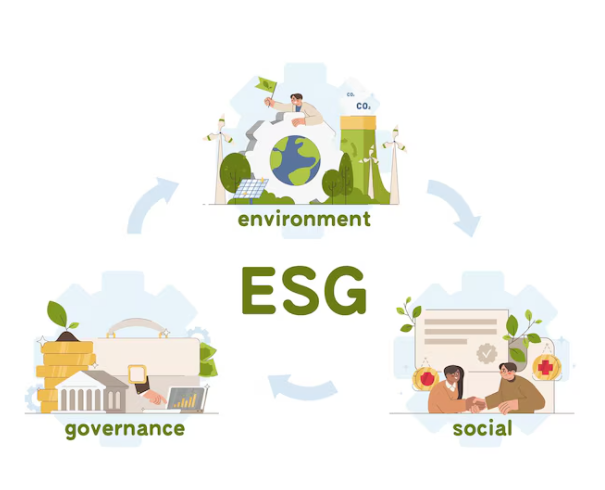ESG is fast emerging as a key driver behind the assessment of investment opportunities particularly in the areas of sustainability, environmental consciousness, social inclusion, and good governance. ESG comprises these criteria which help to ensure compliant business operations, fair treatment of employees and stakeholders, and robust governance mechanisms which together can help create a better tomorrow. By focusing on the holistic performance of a company along these lines, E in ESG evolves beyond the traditional, financial metrics to a certain future-proof a company and its overall strategy is.
In matters of investments, ESG has become particularly important as businesses with strong ESG practices are known to have more robust operations, greater agility, resilience, and processes and policies that help them to deliver solid results in a rapidly evolving business landscape. ESG helps to provide the foundation of trust, ethical decision-making, management, accountability, and stakeholder well-being. As prospective investors are keen to assess the ESG performance of a business, delivering key ESG outcomes often becomes relevant to ensure compliance with regulations, public goodwill, and also continued support from the investor community.
Why ESG Governance Matters to Investors
The governance pillar in ESG defines how the management of an organization governs its people processes and systems for the long run. For a prospective investor knowing how strong an organisation’s governance mechanism is, is core to a certainty of its future robustness and scalability. Because governance typically comprises policies, frameworks, decision making systems and reporting practices, having a strong governance framework directly impacts the organisation by making it more likely to be able to meet regulations, risks in the business environment, and overall uncertainty that the future may bring. Governance is a key determinant in ensuring that the organisation strategy is implemented and accountability is established. Good governance also ensures that appropriate reporting, monitoring and course correction measurements are in place.
Key ESG Governance Factors That Drive Investor Confidence
• Board constitution and independence criteria: How an organisation board is constituted and represented by its board of directors directly drives the overall standards of corporate governance and an organisation’s ability to navigate the complexities of its business environment. A board with diverse directors with minimal conflict of interest will result in better decisions that are made keeping in mind the interest of the organisation and the various shareholders it is accountable to.
o Overall transparency of reporting: Having a robust mechanism of collecting ESG data and monitoring its overall performance is relevant for the management to assess the underlying risks and opportunities. Providing clear and comprehensive disclosures will help both regulators and investors assert and the company’s performance in real time. Having transparent reporting mechanisms also helps companies create a goodwill in the market which is often a key determinant and inspiring stakeholder confidence.
• Accountability of the administrators: Having strong governance makes the administration and executives directly responsible for practises and policies within their respective spans of control. This includes both financial and ESG related commitments to the predetermined strategy. More often than not a direct linkage between the compensation of the administration and the fulfilment of the ESG performance, KPI’s shows that there is an overall alignment and demonstrated commitment towards achieving the goals.
• Managing risks: It is important for any organisation to assess its operational risks in the immediate business environment as also those in the near to mid-term. Companies which have strong governance standards armour equipped to foresee these challenges and proactively formulate risk mitigation strategies. This has the added benefit off suitable budgetary allocations being made well in advance to mitigate potential risks.
• Shareholder rights: Strong governance spawns effective and equitable voting processes such as constituting appointments to key power positions within the organisation. Transparent and process driven voting and appointment mechanisms deliver not only fair and inclusive results but also stronger commitment from the management to deliver on the predetermined goals.
• Ethical ways of doing business: Organisations which have good governance structures often have established policies that help identify, detect and mitigate potential conflicts of interest within organisations mission, vision and value systems. Having clearly articulated codes of conduct, whistleblower frameworks and compliance-led training, directly helps to create a culture of ethical operations and long-term alignment with the organisation core values.
• Alignment with long term strategies: Governance frameworks often incorporate an organisation’s long-term goal particularly keeping in mind its financial, social and environmental commitments. Be it responsibility structures, monitoring mechanisms and overall commitment to the future, good governance creates a road map for an organisation to not only perform in the near term but also be prepared to achieve its long-term goals.
How Companies Can Strengthen Their ESG Governance to Attract Investors
Minimising bureaucracy and improving on operational performances, decision-making can be streamlined to bring forward the effectiveness of governance framework. Also, by defining the responsibilities often organisation can be allocated with enhanced performance that can eventually build a trust factor among investors by showcasing accountability and excellence in areas of operation. Below mentioned are few of the techniques that can help strengthen and accompany easy governance practices.
• Risk mitigation: With a strong governance foundation that is instrumental in real time evaluation of financial risks of a company is very important. With internal controls and compliance that is effective a company can safeguard itself from green washes or other sort of discrepancies and thus mitigates the risk factor driving investor trust.
• Stakeholder engagement: Governance practices that are clear with transparent communication always help stakeholders like employees’, communities and other customers to get more involved in the organisation. If the organisation involves the stakeholder in the decision-making process, it not only fosters a dedication between stakeholders but also enhances the confidence of investors by reflecting on a well-rounded approach which is both inclusive and transparent.
• Sustainability: With the focus on ESG strategies governance in the present limelight values creation that is long term. By aligning the objectives of a company that can meet sustainability goals, social requirements and appeal to investors to seek a responsible and durable investment strategy is an effective way. Also getting an ESG certification is another way of validating governance, excellence and fostering investor trust.
The Future of ESG Governance in Investor Decision-Making
With investment strategies the focus on ESG has been increasing and the role of governance here takes a pivotal place. Moving beyond the traditional norms of finance and evaluating companies based on their financial ability, investors are now focusing on how organizations are navigating global challenges like social inequality, climate change and other aspects of sustainable growth. The future of ESG governance will witness not only a growth curve but also with the help of advanced technologies like blockchain and AI it will enhance the reporting structure, traceability and with real time insight help in an organization’s long-term success to attain sustainability goals. Moreover, with investor trust and changing regulatory reports, organizations will come up with robust governance practices and continue to evolve, placing itself in the investment landscape as a future-ready company. With the growing governance standards ESG governance will become more important in investor decision-making in future.
Conclusion
With the integration of governance practices, investment strategies are no longer an optional entity but completely mandatory in this economic landscape. Acting as the basic foundation of ESG governance, it ensures not only transparency, risk mitigation but accountability that holds the trust factor of investors and other stakeholders, focusing on ethical leadership, governance practices, prioritises, resilience and heightened security on global level. Thus, socially responsible investors who endure value, are coming in limelight and shaping a balanced corporate ecosystem.
FAQ
What industries benefit most from strong ESG governance?
Industries that deal with technology, manufacturing, finance or energy benefit the most from ESG governance. Facing high regulatory scrutiny, these sectors are majorly impacted and should have a strong governance practice. Moreover, the healthcare industry along with consumer goods also rely on robust governance practices to maintain its stakeholder confidence.
What is the goal of governance in ESG?
The objective of governance and ESG is to keep check whether the organisation has all its reporting framework maintained in a transparent way and the decision-making is aligned with ethical practises so that stakeholders have trust and investors are interested to invest in that organisation. Governance ultimately helps the companies to enhance its credibility in a wider economy.
What is an example of ESG governance?
Implementing an independent structure of directors who can be in the decision-making process can be a perfect example of ESG governance practice. Also, adopting a reporting framework that is transparent and meets sustainability goals is another example of ESG governance. This action builds trust among stakeholders and demonstrates a business dedicated to ethical practices.







